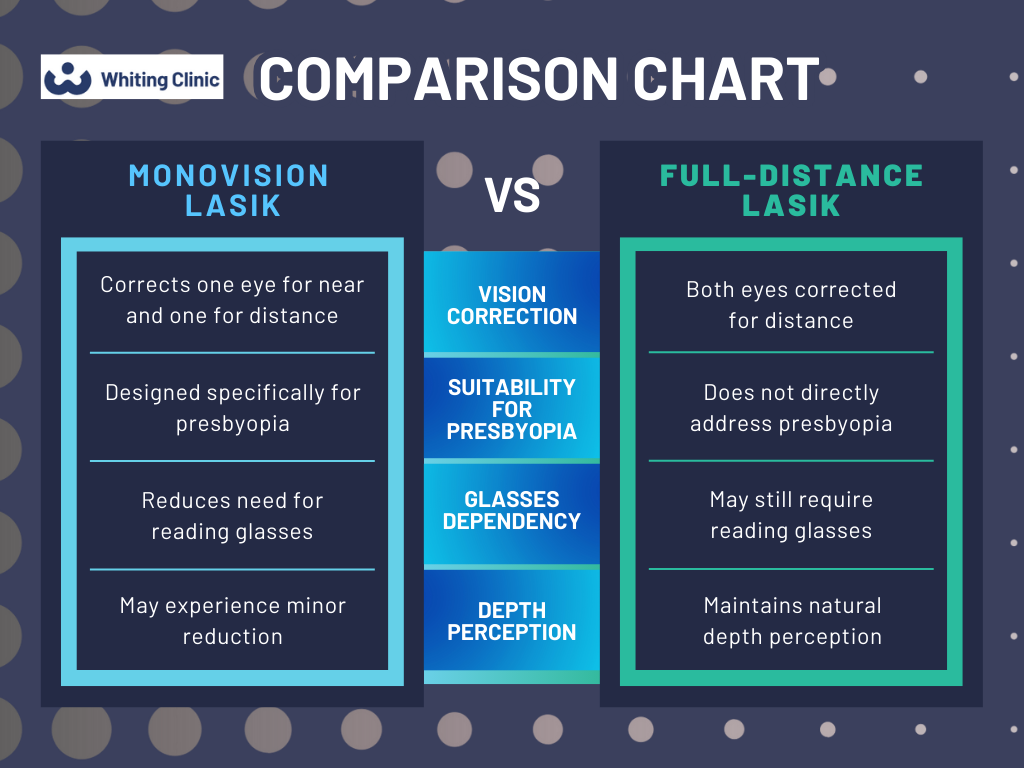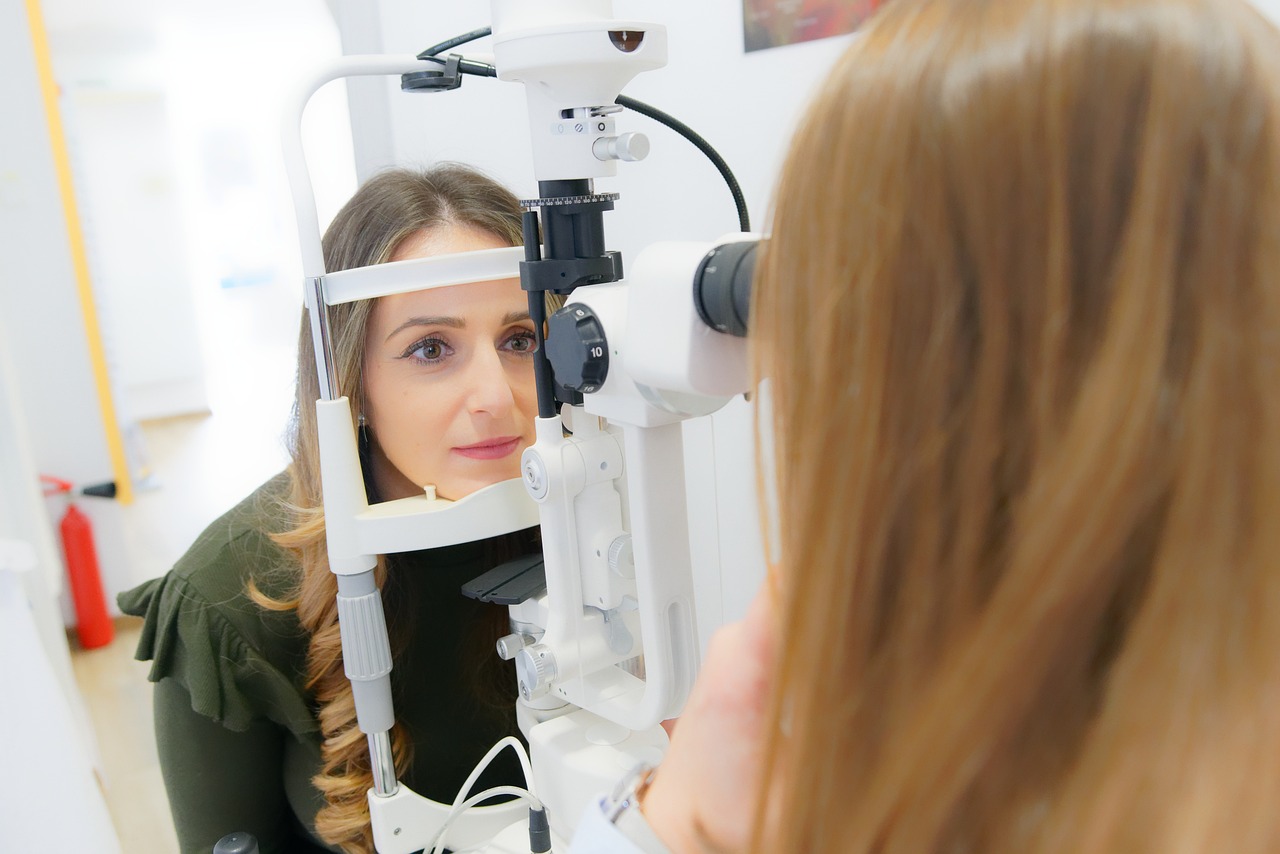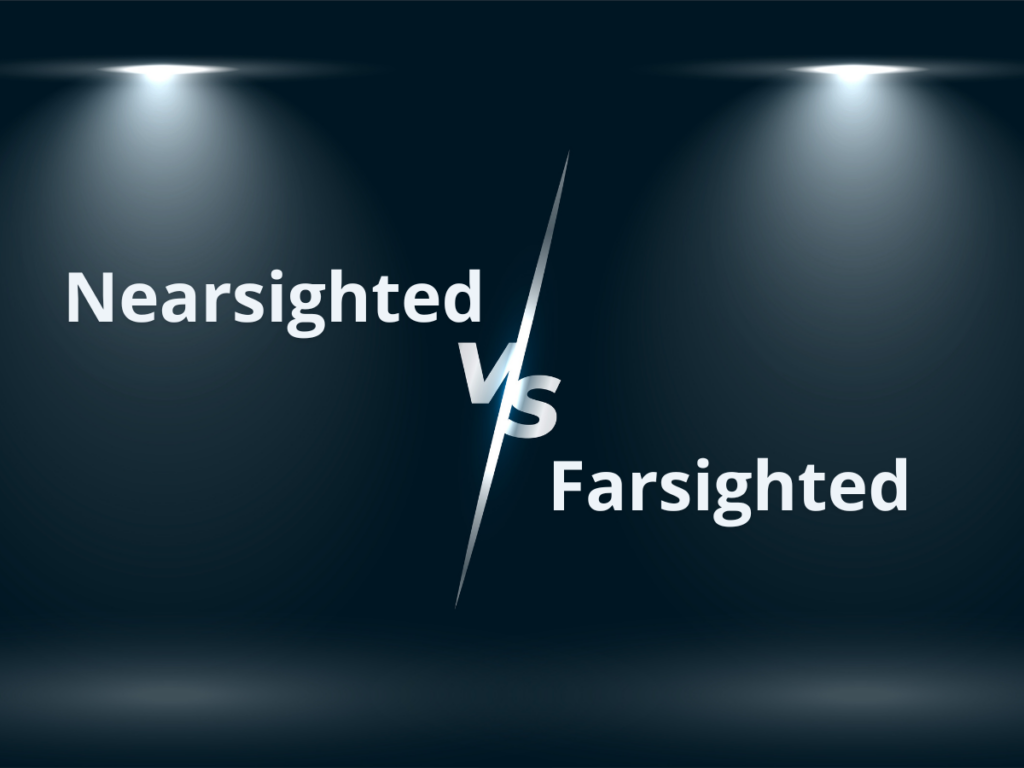Tired of juggling reading glasses with your daily activities?
Aging brings inevitable changes to our vision, often resulting in presbyopia, which can affect daily activities and quality of life. Monovision LASIK is an advanced laser vision correction option that addresses presbyopia, enabling patients to regain their ability to see clearly at different distances without relying on reading glasses or bifocals.
Understanding Presbyopia
Presbyopia is a common, age-related vision condition that causes difficulty focusing on near objects. It occurs due to a gradual loss of elasticity in the lens of the eye, making it harder to focus on close-up tasks such as reading or using a smartphone.
Symptoms of presbyopia typically begin around age 40 and worsen over time. People with presbyopia may experience:
- Blurred vision at near distances
- Difficulty reading without holding materials at arm’s length
- Eye strain when focusing on near objects
- Frequent headaches
What Is Monovision LASIK?
Monovision LASIK is a specialized form of LASIK surgery designed for individuals with presbyopia, a common age-related condition where the eye’s lens loses flexibility, making it difficult to focus on close objects. This laser procedure corrects one eye (typically the dominant eye) for distance vision and the other for near vision, effectively creating a balance that improves overall visual functionality. By employing advanced laser technology, Monovision allows patients to enjoy a greater range of vision without the constant need for corrective lenses.
Key Features of Monovision LASIK for Presbyopia
- Precision Correction: Adjusts one eye for close-up tasks and the other for distance, providing a balanced vision for daily activities.
- Customizable Approach: Personalized for each patient’s visual needs and lifestyle preferences.
- Reduced Dependence on Glasses: Most patients find that their need for reading glasses or bifocals is significantly reduced or eliminated.
The Benefits of Monovision LASIK for Presbyopia
Monovision offers several compelling advantages for those experiencing presbyopia. Below are some of the key benefits that patients may experience:
- Enhanced Vision at Various Distances: Monovision allows for better distance and near vision simultaneously, improving quality of life by making everyday tasks, such as reading, driving, and using digital devices, more manageable without the aid of glasses.
- Long-Lasting Results: Once the procedure is performed, patients can generally enjoy its benefits for many years. Though presbyopia may progress over time, Monovision typically provides a durable solution that supports improved vision well into older age.
- Convenience and Lifestyle Improvement: For individuals who lead active lifestyles, the freedom from glasses or contact lenses offers an unmatched level of convenience. Many find it easier to travel, engage in sports, or enjoy hobbies like reading or crafting without needing bifocals or readers.
- Reduced Eye Strain: Monovision LASIK can reduce the eye strain associated with constantly switching between different types of corrective lenses.
Who is a Good Candidate for Monovision LASIK?
Monovision LASIK may be a suitable option for adults over 40 who:
- Have presbyopia
- Have healthy eyes and corneas
- Do not have any significant underlying eye conditions
- Are bothered by their dependence on reading glasses
- Have realistic expectations about the results of LASIK surgery
During a comprehensive pre-operative consultation, your ophthalmologist will evaluate your candidacy for Monovision LASIK. They will assess your eye health, measure your corneas, and discuss your individual vision needs and goals.
Potential Risks and Considerations with Monovision LASIK
While Monovision offers numerous advantages, understanding the potential limitations and risks is essential. Although rare, patients may experience:
- Adjustment Period: Adjusting to Monovision can take time. Initially, the brain may take several weeks to adapt to the new way of seeing.
- Visual Imbalance or Depth Perception Issues: Some patients report difficulty with depth perception or nighttime driving, particularly in low-light conditions.
- Slight Reduction in Visual Acuity: A small number of patients may notice that the overall sharpness of their vision is less than with full-distance LASIK.
Monovision LASIK vs. Full-Distance LASIK for Presbyopia
Understanding the difference between Monovision LASIK and traditional LASIK is important when choosing the right procedure for presbyopia.

While full-distance LASIK improves far vision and enhances overall acuity, it does not address near-vision issues related to presbyopia. Monovision uniquely targets presbyopia, allowing for a customized approach that adapts to the aging eye’s needs.
FAQs:
Q: Will Monovision LASIK affect my depth perception?
A: Some patients may experience mild adjustments in depth perception. Typically, the brain adapts over time, and most individuals notice minimal impact on daily activities.
Q: How long will the results of Monovision LASIK last?
A: The results of Monovision LASIK are generally long-lasting. However, as the eye continues to age, some patients may experience additional vision changes that may warrant further corrective measures.
Q: Can Monovision LASIK be reversed if I don’t like the results?
A: If Monovision LASIK does not suit a patient’s lifestyle, enhancements can sometimes be made to revert to full-distance vision correction, though this is rare. It’s essential to have a thorough discussion with an eye specialist to weigh all options.
Ready to explore if Monovision LASIK is right for you?
Deciding on Monovision LASIK involves careful consideration of personal visual goals and lifestyle needs. For patients over 40 dealing with presbyopia and desiring more independence from glasses, Monovision may offer a life-enhancing solution. This procedure is highly individualized, and consulting with an experienced LASIK surgeon will help determine if this option aligns with your vision correction goals.
Sources:
LASIK surgery: Is it right for you? (2023, June 27). Mayo Clinic. https://www.mayoclinic.org/tests-procedures/lasik-eye-surgery/in-depth/lasik-surgery/art-20045751
Professional, C. C. M. (n.d.). Presbyopia. Cleveland Clinic. https://my.clevelandclinic.org/health/diseases/8577-presbyopia
Monovision LASIK – EyeWiki. (2023, October 3). https://eyewiki.aao.org/Monovision_LASIK
Categories





